[vc_row][vc_column][ult_buttons btn_title=”Click Here to read Ethiopia 2016 mission trip report (March 4-13)” btn_link=”url:http%3A%2F%2Fmyemail.constantcontact.com%2FEthiopia-Mission-Trip-Report-.html%3Fsoid%3D1123418302438%26aid%3Dik7QZz3pXDI||” btn_align=”ubtn-center” btn_size=”ubtn-block” btn_title_color=”#ffffff” btn_bg_color=”#dd9933″ icon_size=”32″ btn_icon_pos=”ubtn-sep-icon-at-left” btn_font_style=”font-weight:bold;” btn_font_size=”desktop:20px;”][ult_buttons btn_title=”Click Here to read Haiti trip report (May24- June 4)” btn_link=”url:https%3A%2F%2Fmyemail.constantcontact.com%2FHaiti-Mission-Trip-Report-.html%3Fsoid%3D1123418302438%26aid%3DAc2w52x0Lhg||” btn_align=”ubtn-center” btn_size=”ubtn-block” btn_title_color=”#ffffff” btn_bg_color=”#dd9323″ icon_size=”32″ btn_icon_pos=”ubtn-sep-icon-at-left” btn_font_style=”font-weight:bold;” btn_font_size=”desktop:20px;”][ult_buttons btn_title=”Click Here to read Bolivia mission trip report (July 9- 16)” btn_link=”url:https%3A%2F%2Fmyemail.constantcontact.com%2FBolivia-2016-Mission-Trip-Report-.html%3Fsoid%3D1123418302438%26aid%3D8hyU1DTMsrQ||” btn_align=”ubtn-center” btn_size=”ubtn-block” btn_title_color=”#ffffff” btn_bg_color=”#dd952a” icon_size=”32″ btn_icon_pos=”ubtn-sep-icon-at-left” btn_font_style=”font-weight:bold;” btn_font_size=”desktop:20px;”][ult_buttons btn_title=”Click Here to report Bolivia mission trip (August 20- 24)” btn_link=”url:https%3A%2F%2Fmyemail.constantcontact.com%2FBolivia-2016-Mission-Trip-Report-.html%3Fsoid%3D1123418302438%26aid%3D8hyU1DTMsrQ||” btn_align=”ubtn-center” btn_size=”ubtn-block” btn_title_color=”#ffffff” btn_bg_color=”#dd9323″ icon_size=”32″ btn_icon_pos=”ubtn-sep-icon-at-left” btn_font_style=”font-weight:bold;” btn_font_size=”desktop:20px;”][ult_buttons btn_title=”Click Here to read Egypt mission trip (November 2-12)” btn_link=”url:https%3A%2F%2Fmyemail.constantcontact.com%2FEgypt-2016-Mission-Trip-Report–Corrected-.html%3Fsoid%3D1123418302438%26aid%3DUgXRXq1RBX8||” btn_align=”ubtn-center” btn_size=”ubtn-block” btn_title_color=”#ffffff” btn_bg_color=”#dd9323″ icon_size=”32″ btn_icon_pos=”ubtn-sep-icon-at-left” btn_font_style=”font-weight:bold;” btn_font_size=”desktop:20px;”][/vc_column][/vc_row][vc_row][vc_column][vc_empty_space][/vc_column][/vc_row][vc_row][vc_column][sd_testimonials][/vc_column][vc_column][/vc_column][/vc_row][vc_row][vc_column][vc_tta_accordion color=”turquoise” active_section=”1″ collapsible_all=”true” title=”Testimonials”][vc_tta_section title=”Written by Youstina Assad” tab_id=”1549039548417-15fbf7e2-a0a4″][vc_column_text]The moment we stepped out of the airport, we were hit by a wave of love. From the handmade banners welcoming us to Bolivia, to the song-and-dance routine the youth had prepared, to the bracelets and flowers given to us by the youngest of the Bolivian congregation, we were surrounded by enthusiastic Spanish we didn’t understand and people who greeted us, as one of the doctors later said, “like we were long-lost sisters and brothers”. If we had gone home right then and there, we would have been changed people. But we didn’t.
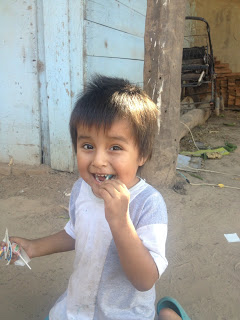
His house is being fixed
The little Bolivian children, who seemed almost to live at the church whenever they weren’t in school, were overjoyed at our presence, regardless of the fact that our Spanish was laughable and they spoke too quickly enough for us to understand anything. But there was something beyond simple linguistic communication, at least enough for me to understand that the little 12-year-old boy in the hallway wasn’t going to let me go until I kissed the lizard he was holding in his hand. A hug and a smile went a long, long way, and tickle-fests surpassed all language barriers. I’ll never forget Samira, a little 7-year-old who made it her mission to drag me around and point at things, saying their names in Spanish and waiting for me to repeat them until I said them perfectly. Oh and the day the youth sang “My Coptic Church” in Spanish, English, and Arabic, then gave a show about Bolivian culture and invited us all to dance with them… It felt like we were the guests of honor, but in reality, we were the ones learning how to be simple, how to give our all and not hold back for fear of rejection. It was unreal.
To be honest, I felt like we were on the most spoiled mission trip the world had ever known. Our luggage was taken from our hands by the biggest smiling teenage faces and got to our rooms before we did. Dinner was prepared at 2AM, and the three (hilarious) monks and the priest in the church stayed up with us as we ate, joking with us and hugging us like we were their biological children from the get-go. The next day, after a beautiful Spanish-English-Coptic liturgy (complete with a guitar and 5-person choir to sing communion hymns), we were taken to a Mariposario, or a butterfly garden, which ended up also being a fancy open buffet, an aviary, a monkey island, and a lake to raft in. And on our way back we went souvenir shopping at the market. Yeah. I told you. Spoiled.
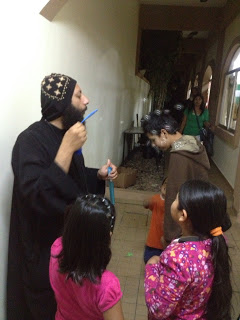
Abouna blowing bubbles with the children
Now don’t get me started on the people who came on the trip. It really was like God hand-picked each and every one as part of a group that would form bonds beyond understanding. From the first night you could tell that there was something special about them. Some of the youth had been drafted by Abouna Anthony to put together a Spanish-English powerpoint for liturgy the next day, and when I came to visit them, all I heard was song. Between the guitar and the various beautiful voices I had the blessing of joining, it really was like “practicing for what we’ll be doing in heaven,” as one of the girls put it. And that became an unspoken theme of sorts for the rest of the trip. Praise and worship nights were heartbreaking and uplifting at the same time, and we’d leave in a little bit of a haze, always a few inches closer to our Creator. In fact, a visiting Abouna from Canada (Father Daniel Besada) commented on one of those nights saying that God had brought him to Bolivia for the sole purpose of sitting in on our praise and worship – it was a “piece of heaven”, according to him.
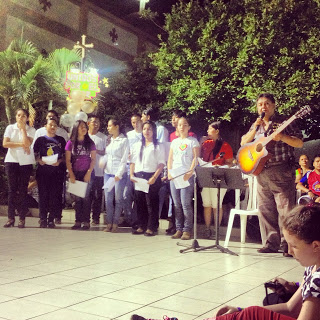
Church Choir
These things set the mood for everything we did in Bolivia.Prayer before and after every surgery we scrubbed in on or just observed, “God bless you!”s after every clinic visit, and new hymns learned with every van ride. Late-night talks covering all topics possible, only to be concluded by one girl exclaiming “you guys, I’m so happy to be surrounded by such Godly people!” and really meaning it, as we all looked around and laughed at how we were the furthest from Godly, but being together changed that.
I make it sound like the trip went by smoothly. Let me fix that.
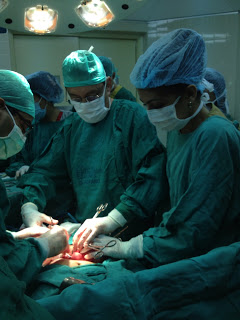
removing a 2lb tumor from a 44yo
The first day, the doctors and students left for the hospitals and clinics, the pharmacists manned the hallway they used to distribute medications, and the kids went on visitations with a few of the fellowship servants. When we got back, the fellowship servants were upset that they couldn’t do more than visit two or three houses a day, and the donations they had were mostly for young children, leaving the high school and college-aged youth empty-handed. The sight of the Bolivian poor had moved their hearts, but their hands were tied, and there was nothing anyone could do. Solutions were still being worked out by the end of the week, but by then, our short time was over, and some left still heartbroken that they had more “fun” than they did work. The work was plenty, the laborers weren’t so few, but the tools were missing.
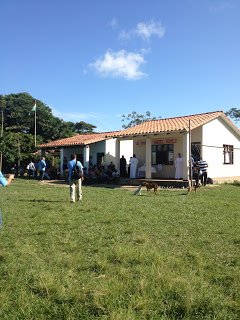
outdoor liturgy at first village
And how about the day we visited the villages and people poured in to get check-ups for themselves and their children. We gladly worked for hours in the first village, then when we finished our lunch break and headed to the second, we realized that we could barely see anyone because it was getting dark and the electricity was going to be cut off in a matter of minutes. We handed out donations and crosses to the youngsters by flashlight as their parents begged to be seen by the doctors they never had the money nor the physical means to go visit. The pediatrician was looking in the babies’ mouths two or three at a time, and the dentist was begging to see “just one more! I can fix this in just a few minutes!” It tore at our hearts to leave that day.
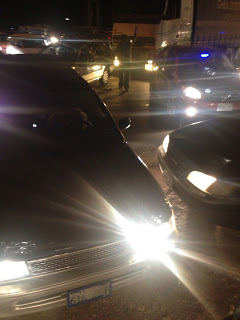
10-mile traffic jam
And oh, the journey back. An unprecedented traffic jam that turned a barely tolerable 45-minute drive into a 4-hour stress-fest as people argued over whether to walk or stay in an motionless van, to stick together or split up, and who really was in charge. Near-death experiences as we almost drove into a massive ditch, the van almost tipped over while maneuvering the grass around the highway, and an ambulance cleared the way for our ride – while we were standing outside of it watching it speed away (we caught up– you’d be surprised how fast you can run when you realize you’re about to be stranded in a third world country in the dark and can’t speak the language). But the prayers we finally said together and the tasbeha that flowed? Our last hour was one of true, sincere Kyrie Eleisons and Psalm 50’s. Everyone prayed straight from the heart, and the moment we lowered our voices, the honking around us started up again and panic ensued until we started a new prayer again. Never before had I felt that I was in the middle of a spiritual battlefield until that moment, but never before had I really known in my heart, without explanation, that we were surrounded by angel warriors. The flights that some of us were supposed to catch that night? We miraculously caught every single one, but I know there was a reason we didn’t get there when we were supposed to. Maybe we forget in our comfortable lives that God’s hand is in everything, but in times when blood pressures rise and fears attack, and there’s nothing anyone can do to change the circumstances, believe me when I tell you, God’s presence is felt.
I’m not doing it justice. The trip was life-changing in ways I can’t describe, and it wasn’t just because of the cliché “they’re so grateful with so little!” realization. It was the day-to-day experiences – the staying up with Abouna Andrawes as he joked around about his pranks in the monastery then suddenly turned serious regarding the emotions God places in our hearts. The listening at the end of the day as your best friend tearfully comes to terms with the fact that she just informed a 23-year-old girl that she has no uterus and can never bear children. The basketball game at 2am and little Elias running to give you a hug every time he gets a bit shy from the others. It’s watching Anba Youssef sit on the ground with the children teasing them, or hearing Abouna Yolios tell you he misses you, even though you haven’t left the room. It’s seeing a mother’s face as the doctor tells her that her baby’s deafening heart murmer isn’t fatal. It’s going home and realizing that you actually helped suture a vagina shut so a woman can keep her dignity by finally being able to control her own bladder again. It’s feeling your arm cramp up while holding up someone’s liver as the surgeon focuses intently on the part of the stomach he’s about to remove. It’s the smile on that 4-year-old’s face when you call her “bonita” as she gets her blood pressure taken for what is probably the very first time.
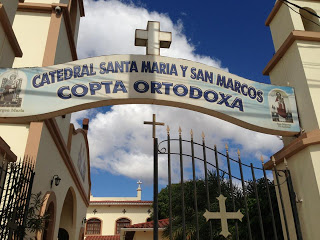
Coptic Cathedral in Santa Cruz
None of us wanted to leave. We didn’t want to lose that closeness we felt with God in the streets of Bolivia. But as one of the guys mentioned in the airport, “you’ll find God wherever you go.” And maybe that’s the lesson we came away with. That the God of Bolivia is the God of Egypt and Kenya and Nigeria and India and the quiet town of Spotswood, New Jersey, even if the suburbs of the US don’t have little children playing in the sand with the family chicken and going home to a tin house smaller than my bedroom. God is God wherever I go, and He’s watching my Sunday School girls the way He’s watching the handicapped orphans in Santa Cruz de la Sierra. They’re His children in exactly the same way, just like the sick in the hospitals here need the same care, attention, and prayer that the ones in South America do.
There’s not much more I can tell you about this one week in Bolivia without sounding like a broken record, but I will say this – if the opportunity presents itself to serve on a mission – any mission – take it. No, scratch that. Search for a mission to go on. Seek one until you find one, and then go. Make time for it, don’t wait for it to be “convenient”. I promise you, you won’t regret it. This week was an investment in something so much more valuable than my earthly future. It opened my eyes to things I didn’t know about myself, and it reminded me of God’s love in ways I can’t begin to describe – ways that have not left me since I got back. Go, and make use of every second there. Then come back with that extra fuel and use it here. Come back with the feeling that you’re a glass container of light, and use it to shine in the services God’s called you to here in America. Doesn’t matter what you do, what your job is, how religious you’ve been, or how old you are. God’ll clean you up and shine you and use you in ways you can’t imagine. He’ll stretch you beyond what you thought were your limits until you realize that with Him, you have no limits. And with that in mind, who knows what you can do for Him and His Bride, the Church?[/vc_column_text][/vc_tta_section][vc_tta_section title=”Written by Monica Salama” tab_id=”1549039548418-e735e247-1021″][vc_column_text]
 I urge each one of us that is studying to be a health professional (easily half of the Coptic youth in North America) to dedicate a portion of our day, week, month, year, or life to minister to God’s people using the skills with which He has equipped us. I guarantee that He will use you in ways you never expect or even imagine. At the same time, you will receive priceless lessons about yourself, others, and the Lord in return. I am both amazed and forever grateful that God has used this opportunity to provide me with much greater healing than that which I came to offer.
I urge each one of us that is studying to be a health professional (easily half of the Coptic youth in North America) to dedicate a portion of our day, week, month, year, or life to minister to God’s people using the skills with which He has equipped us. I guarantee that He will use you in ways you never expect or even imagine. At the same time, you will receive priceless lessons about yourself, others, and the Lord in return. I am both amazed and forever grateful that God has used this opportunity to provide me with much greater healing than that which I came to offer.[/vc_column_text][/vc_tta_section][vc_tta_section title=”Written by Annmarie” tab_id=”1549039592981-f309897c-2be2″][vc_column_text]Before I could process what was happening around me, youth from the congregation quickly took the luggage out of my hands, replacing it with a small bouquet of flowers and a bracelet. We were strangers to them, but they greeted us with what seemed to be a welcome home party.
 The second night, Bishop Youssef gave a history of the Coptic Church in Bolivia. In justten years the church was built, and grew into a congregation of over 500 Bolivians– individuals who likely had no prior idea of what “Coptic” was. They also built a clinic, two day-care centers, and a housing complex for the homeless. His grace also discussed their plans for a second church, a convention center, and a hospital for the future. Amazed by their accomplishments, I asked Sayedna “How did the church become so successful in a short time?”. Bishop Youssef replied, “As you already saw, these people have little money, but this church was built on love.” During the next ten days, I would soon understand what he meant by a church built on nothing other than love.
The second night, Bishop Youssef gave a history of the Coptic Church in Bolivia. In justten years the church was built, and grew into a congregation of over 500 Bolivians– individuals who likely had no prior idea of what “Coptic” was. They also built a clinic, two day-care centers, and a housing complex for the homeless. His grace also discussed their plans for a second church, a convention center, and a hospital for the future. Amazed by their accomplishments, I asked Sayedna “How did the church become so successful in a short time?”. Bishop Youssef replied, “As you already saw, these people have little money, but this church was built on love.” During the next ten days, I would soon understand what he meant by a church built on nothing other than love.A church built on love creates a shelter for those during troubled times
[/vc_column_text][vc_empty_space][/vc_tta_section][/vc_tta_accordion][/vc_column][vc_column][/vc_column][/vc_row][vc_row][vc_column][vc_video link=”https://www.youtube.com/watch?v=DQAM3oQlzkc” el_width=”60″][/vc_column][/vc_row]




